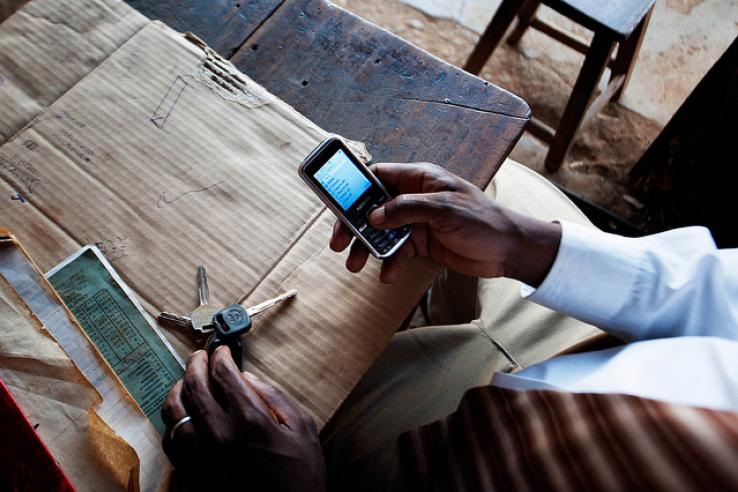Displaying 961 - 975 of 1293
Evaluation
Vaccination programs are considered to be cost-effective strategies to reduce child mortality and morbidity, but in many low-income countries, coverage for routine vaccines remains low. This is due to a range of possible factors including low parent knowledge about the benefits of vaccination, inadequate vaccine supply, and poor supply chain management. In Mozambique, researchers are examining the effectiveness of a mobile application-based solution that uses mobile technology to overcome these challenges and improve vaccination coverage.
Evaluation
Researchers conducted two randomized evaluations to test 1) the impact of providing public spending information on voter attitudes and 2) the impact of cash transfers on parental preferences for education.
Evaluation
Researchers evaluated the impact of providing schools with an unconditional cash grant, a teacher incentive program, or both on student learning. The cash grant had no impact on student learning, while the teacher incentive program had mixed results. However, combining both programs together had an even greater impact on student learning compared to the sum of the effects from each individual component alone.
Evaluation
Informational campaigns and price subsidies are common ways to increase the use of health products in developing countries, but little is known about the effect of combining these tools. In Zambia, researchers investigated whether households’ demand for chlorine at varying subsidy levels was dependent on their knowledge of the product. They found that providing additional information about chlorine significantly increased the impact of price subsidies on demand for the product. However, in the absence of a subsidy, information provision had no significant effect on take-up.
Evaluation
Finding effective strategies to prevent violence and systematic harassment at school can improve student outcomes and wellbeing. Researchers evaluated the effectiveness of two programs aiming to reduce violence and harassment in primary and middle schools in France. Overall, neither program reduced violence or harassment. However, social mediation was effective when the mediator was experienced, and particularly so for students who initially faced higher levels of violence.
Evaluation
Researchers contacted registered voters in a New England town by telephone and asked a portion of these voters to predict whether or not they would vote. This allowed researchers to use a randomized evaluation to measure the impact of making a prediction about future voting behavior on actual voting behavior. The study found no significant effect of prediction-making on voter turnout.
Evaluation
Researchers studied the short- and long-run effects of these reports on electricity use and found that reports reduced energy consumption by about 2 percent across twelve utilities. The reports had the strongest effect in the short-run, but the program had enduring effects among households that were dropped from the program after two years.
Evaluation
Researchers partnered with the largest public bank in Guatemala to measure the impact of light-touch financial products, such as reminders and suggested ‘default’ savings contribution levels, on the savings behavior of microfinance borrowers. Clients who were prompted to save through default contribution requirements and monthly reminders made more deposits and accumulated greater savings than clients who only had access to a basic savings account.
Evaluation
Self-control problems can lead people to fall short of their personal and professional goals, often resulting in lower than desired workplace productivity. Researchers, in partnership with an Indian data entry firm, conducted a randomized evaluation to test whether self-control problems existed in the workplace and strategies mitigate these problems.
Evaluation
In northern Nigeria, researchers evaluated the impact of three community-based interventions designed to enhance uptake of maternal and child health services: a community health worker program, health educators with the provision of safe birth kits, and health educators with community dramas. While the community health educators increased utilization of maternal and infant care, health practices, and knowledge, none of the interventions improved maternal or child health outcomes.
Evaluation
Researchers studied the impact of a community driven development program in Sierra Leone in the short and long-run and contrasted it with a technocratic approach to delegate the management of development projects to high skill individuals. In the short term, the CDD program increased the stock of higher quality local public goods, but did not lead to fundamental changes in local institutions or decision-making in the shorter term. The technocratic selection intervention improved local project management relative to the traditional status quo and the long-term institutional reform through the CDD intervention.
Evaluation
Researchers studied the policy consequences of mandated representation of female policymakers by determining whether there was any difference in the provision of social services between male- and female-led village councils. Results suggest that reservations for female leaders affected policy decisions in ways that seemed to better reflect women’s preferences.
Evaluation
Leveraging the increasingly widespread use of social media, researchers conducted a large-scale randomized evaluation to test the direct and indirect impact on electoral accountability of a nonpartisan information campaign delivered via Facebook ads during the 2018 Mexican municipal elections. Incumbent parties with negligible corruption levels saw their vote share increase by 6-7 percentage points in localities targeted by the Facebook ads.
Evaluation
Researchers examined the impact of door-to-door canvassing on voter turnout in the 2001 local elections in six US cities. The results indicate that voters who were contacted by canvassers were significantly more likely to vote in a wide variety of settings.












